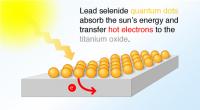Jun 21 2010
New, breakthrough research on quantum dots suggests that the efficiency of the conventional solar cells can be raised from the present 30% to more than 60%. Xiaoyang Zhu and the team at The University of Texas at Austin have identified a new method to capture the excess solar energy for producing highly efficient solar cells. The results of the experiment have been published in the weekly Science journal.
 Xiaoyang Zhu and colleagues discovered that hot electrons can be transferred from photo-excited lead selenide nanocrystals to an electron conductor made of titanium dioxide. Their discovery points the way toward more efficient solar cells.
Xiaoyang Zhu and colleagues discovered that hot electrons can be transferred from photo-excited lead selenide nanocrystals to an electron conductor made of titanium dioxide. Their discovery points the way toward more efficient solar cells.
The current series of silicon solar cells offer a maximum efficiency of 31% as most of the solar energy is too high to be converted into electricity. This excess solar energy is usually lost as heat. However, if this energy is captured, then the efficiency of the solar cells can be increased as much as 66%.
Xiaoyang Zhu, Director of the Center for Materials Chemistry and Professor of Chemistry, said that advanced solar cells can be created by adopting two steps, which is reducing the cooling speed of the hot electrons and capturing those electrons before they lose their energy.
The research team used lead selenide nanocrystals for the former step and an electron conductor made of titanium dioxide for the latter step.
Zhu informed that although the experiment is a significant breakthrough, more science and engineering expertise is needed to produce high-efficiency solar cells. Zhu is also exploring the option for reducing the additional energy lost in electrical conducting wires.